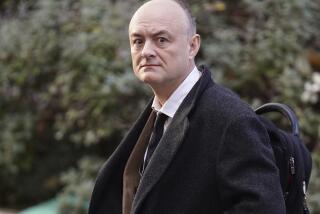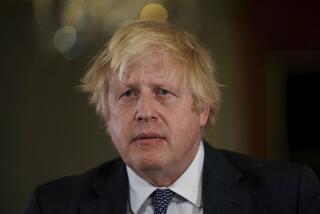NEWS ANALYSIS : Cabinet Chaos Opens Deep Wounds for Thatcher : Britain: âShe will be a less powerful prime minister for months,â predicts one expert.
LONDON â Prime Minister Margaret Thatcher âhas never been worried about people loving her,â one of her closest aides boasted to a small audience of foreigners earlier this week. She has strong views and says what she thinks. At the risk of sounding corny, the aide elaborated, you could characterize her philosophy as: âTo thine own self be true.â
That depiction seemed particularly ironic less than 48 hours later, after a duplicitous bit of personnel management by Thatcher blew up in the surprise resignation of her longtime chancellor of the exchequer, Nigel Lawson.
The resignation triggered a wholesale shake-up of top Cabinet posts, brought turmoil to the financial markets, and inspired some of the harshest criticism of Thatcher in the decade she has been in power.
The Bank of England intervened heavily Friday morning to stop a slump in the value of the pound triggered by uncertainty over the countryâs future economic policy. Prices also fell sharply on the London Stock Exchange, despite Thatcherâs assurance that government policies will continue âprecisely as they were, so we shall have complete continuity.â
The British press was filled Friday with talk of political âcrisis,â even though few here see the prime minister in any immediate danger of losing her job. Still, according to many analysts, the affair has opened deep wounds which at the very least will diminish her political maneuvering room.
âShe will be a less powerful prime minister for months, or possibly right up to the next election,â said Anthony King, professor of government at Essex University and a respected political commentator.
On Friday, the Independent titled its lead editorial, âThe Prime Minister Who Betrayed Her Own Government.â It concluded that while she may remain in office, âher great days are over.â
Even the tabloid Sun, Britainâs largest-circulation newspaper and ardently pro-Thatcher, conceded that her position was âinevitably . . . shakenâ by the affair.
Lawson resigned Thursday after Thatcher refused his demand that she fire Alan Walters, her personal economic adviser, over public comments critical of the chancellorâs policies. Within a couple of hours, Walters also resigned and Thatcher had a new finance minister, John Major.
Although Lawson may have reacted partly to hurt pride, the affair goes much deeper than that. Walters had been speaking out for at least 18 months, since long before Thatcher hired him as a $50,000-a-year, part-time adviser last May. His position was thus seen as a clear slight to Lawson, who is the Cabinet officer supposedly in charge of government economic policy.
In fact, Thatcher has had policy differences with Lawson for months, and Waltersâ presence at No. 10 Downing Street was a constant reminder of the tension.
âHere we have a chancellor whose position has been rendered intolerable by an agent of the leader,â Thatcher biographer Hugo Young wrote in the Guardian. âHer taunting of Lawson, by failing instantly to repudiate Walters, drove the last big man outâ of her Cabinet.
The conservative Daily Telegraph, in an otherwise sympathetic editorial, chided the prime minister: âLeadership, in which she excels, must not degenerate into dominance, intolerance, and a simple refusal to work with those she has appointed to serve her. Even before the Lawson decision, there was mounting evidence in the country of a certain restlessness with her style.â
The Financial Times recalled that just three months ago Thatcher shunted aside her longtime foreign secretary, Geoffrey Howe. It said that with Lawsonâs departure, she has managed to alienate two important contributors to the revolutionary changes known as âThatcherism.â
âFrom being a government of people committed to a set of coherent, radical and timely ideas, it has now become a government committed to the prime minister herself,â the newspaper said. âAs she has become more pre-eminent, her government has become much more vulnerable.â
What baffled many was the way this most determined of prime ministers was apparently so indecisive when it came to a policy conflict between two members of her governing team. Similarly, two years ago, she allowed a Cabinet dispute over how best to save Westland, an ailing government helicopter manufacturer, to fester to the point of rupture. Two of her ministers, Michael Heseltine and Leon Brittan, resigned in that fracas.
Actually, wrote biographer Young, the Westland affair and Lawsonâs resignation underline a common Thatcher leadership tactic that has now received âits devastating comeuppance.â
Young calls it âcovert distancingâ--endorsing a policy in such a way that there always remains a suspicion that she opposes it. âThe gift (that her tactic) bestowed, of excusing her for policy failures, was sometimes thought to reveal her political brilliance,â he wrote.
It works with people as well as policies, said Essex Universityâs King, who said in an interview that Thatcher has a habit of âreferring to other members of her own government as âthemâ and âtheyâ as if she didnât have anything to do with it.â
In the aftermath of Lawsonâs embarrassing resignation, King predicted, Thatcher will be forced to revert âto something more like the British norm of collective leadership.â
The Independentâs highly regarded political columnist Peter Jenkins noted that the immediate policy issue underlying Lawsonâs departure was a dispute over full British membership in the European Monetary System. This is a step that Thatcher is loathe to take because it might amount to ceding partial control over her countryâs economic policy to the European Community.
âEurope has been the issue underlying most of Mrs. Thatcherâs biggest errors,â Jenkins wrote. âEurope was at the root of the Westland affair, which in 1986 provoked the resignation from the Cabinet of Michael Heseltine and, by her own admission, could have brought her down.
âIt was Europe which drove her to excesses which helped to lose her the elections to the European Parliament last June. Europe was the issue on which she sacked . . . (Howe) from the Foreign Office last summer, badly upsetting her party in the process.â
The question of Britainâs future role in a more united Europe âis the big, seismic issue of the 1990s,â agreed John Barnes, a lecturer in government at the London School of Economics, âand itâs one the Tories are ill-equipped to handle at the moment.â
Barnes, who is an acknowledged expert on the Conservatives, said in an interview that âif Mrs. Thatcher withdrew (from office) at this point, thereâd be a huge sigh of reliefâ among many in the party. However, he said, he sees little chance of her stepping down voluntarily. Meanwhile, âthe only way there would be a coup against her in the Conservative party is if all the possible successors agreed on one of them,â he said.
That is an unlikely possibility, King agreed. âWho is going to take risks with his political career to make someone else prime minister?â he asked.
But with the revitalized, opposition Labor Party already looking more like a credible alternative than at any time in the last decade, and Thatcherâs government slipping in the polls, Lawsonâs startling departure clearly adds to the prime ministerâs troubles.
As the Guardian said Friday: âPolitically, this is one hell of a mess.â
WHOâS WHO IN CABINET CRISIS
Margaret Thatcher, in midst of the worst political crisis in her decade in power, shuffles her Cabinet.
Nigel Lawson--His resignation Thursday as chancellor of the exchequer astonishes Parliament.
Alan Walters--Thatcherâs personal economic adviser, who feuded with Lawson, also quits.
John Major--A former Lawson assistant, he replaces his former boss in the exchequer post.
Douglas Hurd--He moves from the Home Office to head the Foreign Office.
David Waddington--Parliamentâs chief business manager, he replaces Hurd as Home Secretary.
More to Read
Sign up for Essential California
The most important California stories and recommendations in your inbox every morning.
You may occasionally receive promotional content from the Los Angeles Times.










